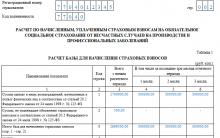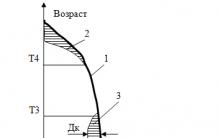IN economic activity There are many issues that arise in an enterprise that lead to the formation of debt. However, it is not always negative. For example, in cases where organizations must ( accounts receivable) there is nothing wrong if she is not hopeless.
It is much more unpleasant when the company itself owes. But here there are nuances: for example, debts to the budget are estimated as accounts payable, but are not in the direct, common sense, debts until the time for their payment has come.
Let's consider the components of this debt and the procedure for accounting for it.
The concept of accounts payable in the budget and its reflection in accounting
Accounts payable are liabilities (debts) legal entity before other business entities, credit organizations, budget and off-budget funds.
It is reflected in liabilities balance sheet on line 1520 and includes calculations:
- With buyers;
- With suppliers;
- With a budget;
- With extra-budgetary funds (according to various types social insurance);
- With employees wages;
- With founders and participants (for payment of dividends, interest and other income);
- With accountable persons;
- With creditors and debtors for other debts (for example, for advances received under contracts).
Accounts payable to the budget include obligations for taxes and fees. In this case, it can be either a current payment or a payment deadline for which has not yet arrived. how to write off accounts payable.
To reflect the situation with the payment of taxes and fees, active-passive account No. 68 is used. His loan takes into account the amount of taxes and fees accrued and indicated in the declarations (“debts” to the budget). For example, posting Debit 99 Credit 68 (hereinafter referred to as D and K, respectively) means that income tax has been accrued. A D 70 K 68 - personal income tax (NDFL).
The debit of the account reflects taxes and fees paid (debt repayment). In particular, posting D 68 K 51 means payment of any tax from the current account of the enterprise.
- Credit balance based on results reporting period means the presence of debt of a legal entity on taxes and fees.
- Debit- indicates budget debts to the enterprise (company) or - overpayment of tax payments.
How to pay off debt - correspondence of invoices and postings
 For more detailed accounting this account is divided into subaccounts for specific taxes. Penalties and fines for non-payment are also taken into account here.
For more detailed accounting this account is divided into subaccounts for specific taxes. Penalties and fines for non-payment are also taken into account here.
In this case, there is no difference whether the organization pays taxes for itself or acts as a tax agent (for example, transfers personal income tax for its employees). Any payables for tax payments are reflected in this account.
This account corresponds by debit with the following accounts:
- 19 — VAT on purchased valuable goods;
- 50 - cash register;
- 55 - special bank account;
- 66 (67) - calculations for loans and credits (short- and long-term).
For the loan, the account corresponds with the following positions:
- 08 - investments in non-current assets (funds);
- 10 - materials;
- 11 - animals being fattened and raised;
- 15 - purchase (procurement) of material assets;
- 20 (23) - main (auxiliary) production;
- 26 - expenses for general economic needs;
- 29 - service industries;
- 41 - goods;
- 44 - sales expenses;
- 51 (52) - current (currency) account;
- 55 - special bank account;
- 70 (75) - settlements with employees for wages (with founders for income paid to them);
- 90 - sales;
- 91 - other income and expenses;
- 98 - future income;
- 99 - profit and loss.
Payment of taxes and fees is reflected in active-passive account No. 68.
Accounting for individual taxes and fees
Let's consider (without specifying details and all possible cases) the main entries used in accounting for transactions related to the calculation of taxes and their payment to the budget.
Federal taxes

- Income tax. It is paid from profit, accrued on its amount and the amount of other income, therefore accounts 99, 91 are used.
- Personal income tax. It is paid from the income of employees, therefore it corresponds to the account 70.
Other taxes and fees
- Property tax. It is paid from pre-tax profits. Therefore, it is taken into account “in conjunction” with a score of 91.

- State duty. It is transferred to the budget for various operations, for example, for registering ownership of fixed assets, considering a case in arbitration court, notarial acts. This “creditor” is also accounted for on account 68, in “link” with accounts 91 (fee in court, for notarization) and 08 (for the acquisition non-current assets in the form of a certificate of ownership).
- Sanctions for incomplete or late payment of taxes.
Thus, the main points on such a phenomenon as accounts payable for taxes and fees are considered.
In conclusion, it should be noted that when acknowledging, claiming or paying any debt, whether payable or receivable, to legal or individuals, its painstaking accounting and correct documentation is very important. And this is a matter for lawyers and financiers.
Happy cooperation!
The obligation of payers to pay taxes is established by the Constitution of the Russian Federation (Article 57 of the Constitution of the Russian Federation), as well as Tax Code(Clause 1, Clause 1, Article 23 of the Tax Code of the Russian Federation). If the payer neglects this responsibility and does not pay taxes/fees, then a debt on taxes and fees arises, which the tax authorities, in turn, have the right to collect (clause 9, clause 1, article 31 of the Tax Code of the Russian Federation).
Collection of debts on taxes and fees from organizations and individual entrepreneurs
If the payer has arrears to the budget, tax authorities make every effort to repay it. To begin with, a requirement to pay tax is raised (Article 69 of the Tax Code of the Russian Federation). If the payer did not respond to the tax authorities’ demand and did not repay the arrears within the time period specified in the request, then taxes will be collected in a compulsory, indisputable manner: first at the expense of cash on the payer’s accounts (Article 46 of the Tax Code of the Russian Federation), and if there are insufficient funds or if the Federal Tax Service does not have information about the payer’s accounts - at the expense of the payer’s other property (clause 7 of Article 46, Article 47 of the Tax Code of the Russian Federation).
By the way, in order to ensure the execution of the decision of the Federal Tax Service on debt collection, tax authorities have the right to suspend transactions on the accounts of the payer-debtor (clause 1 of Article 76 of the Tax Code of the Russian Federation).
Settlement of debts on taxes and duties of an individual
An ordinary individual (not an individual entrepreneur), as well as an organization/individual entrepreneur, if there is an arrears, is presented with a payment requirement. If the individual ignores it, then the tax authorities have the right to go to court to collect tax debts from the individual’s funds and other property (Article 48 of the Tax Code of the Russian Federation).
Debt on taxes and fees: accounting account
To reflect transactions on settlements with the budget for taxes and duties, account 68 “Settlements for taxes and duties” is provided (Order of the Ministry of Finance dated October 31, 2000 No. 94n). Debt on taxes and fees is recorded on credit 68 of the account.
Debt on taxes and fees in the balance sheet
The company's obligations, including to the budget, are reflected in liabilities. Debt on taxes and fees is shown either in section IV “Long-term liabilities” on line 1450 “Other liabilities” (for long-term debt in respect of which the payer has been granted an installment plan/deferment, investment tax credit), or in section V “ Current liabilities» on line 1520 “Accounts payable”.











Carrying out an inventory
Ulyukaev, Navka and Patrushev
Income tax refund for treatment: registration procedure and calculation of the deduction amount
Import substitution - what is it?
OSAGO minimum insurance period